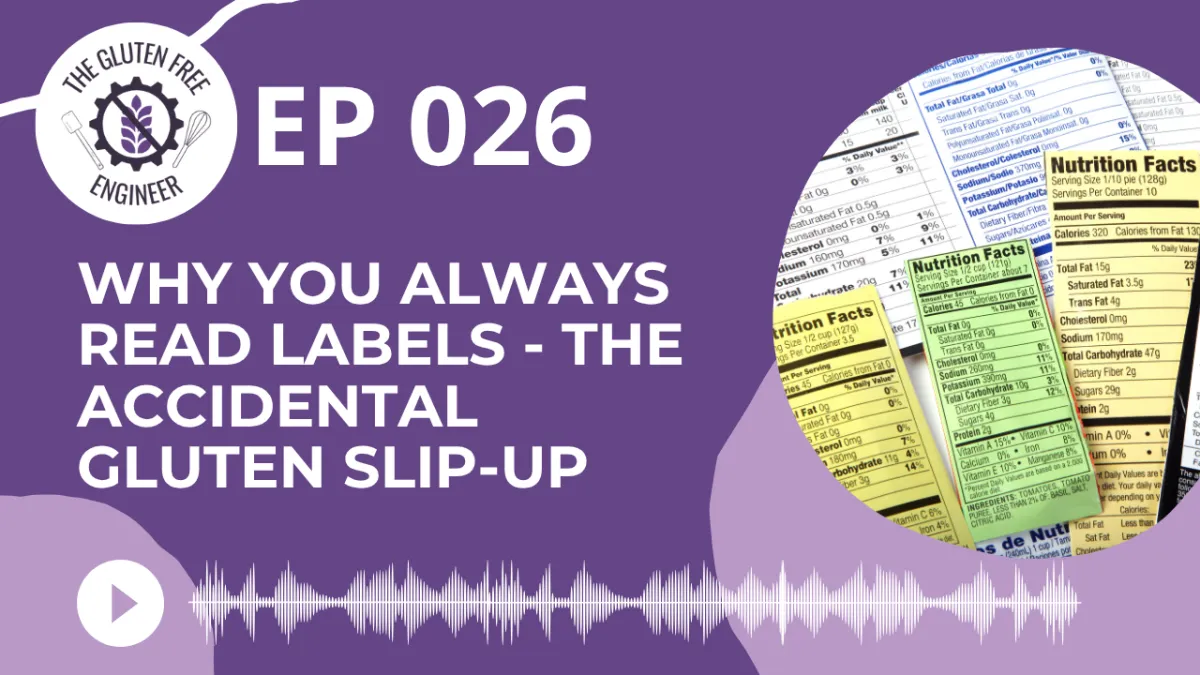
#26: Why you Always Read Labels - The Accidental Gluten Slip-Up
Have you ever had that moment where you realize—too late—that you forgot to read the label?
Yeah… that was me last week. After years of being so careful, I let my guard down with a product that looked gluten-free. Spoiler alert: it wasn’t.
In this episode, I’m sharing what happened, what I wish I had done differently, and why it’s so important to always, always read the label—even when you think you already know what it says. Whether you’re newly diagnosed or years into this journey, this episode is your friendly reminder to stay vigilant—and extend yourself grace when things go sideways.
The Importance of Label Reading: A Painful Reminder for Celiacs
For those of us living with celiac disease or gluten sensitivity, vigilance is our constant companion. Yet, even after 12 years of living gluten-free with celiac disease, I found myself in a situation that serves as a powerful reminder that we can never let our guard down. Last week, I experienced an accidental gluten exposure that left me dealing with symptoms for days afterward, all because I made an assumption about a product without properly reading the label.
The Mix-Up: When a Sour Ale Masquerades as Cider
The incident occurred when my husband brought home what we both assumed was a hard cider. The product was fluorescent green, packaged with colorful labeling that resembled other ciders, and was even displayed near the hard ciders in the store. It didn't look like typical beer packaging at all. After my husband had already consumed one or two over several days, I decided to try a small sip myself. It wasn't until the following day that I actually read the label carefully and discovered to my horror that it was a wheat-based sour ale – not a gluten-free cider as we had assumed.
The Aftermath: How Two Sips Wrecked My System
The aftermath of this small exposure – literally just two tiny sips across two days – was dramatic and debilitating. The morning after my second sip, I woke up feeling like I'd been run over by a bus. My entire body ached. My brain functionality was severely compromised. My joints throbbed with pain. My senses were completely overloaded, making me hypersensitive to noise, light, and information. The digestive symptoms, while present and uncomfortable, were actually less disruptive than these systemic effects. The most frustrating part? Three days later, I was still experiencing symptoms, a stark reminder of how seriously celiac disease impacts our bodies.
Lessons Learned: Read Every Label, Every Time
This experience reinforced several critical lessons for anyone living gluten-free.
Always read labels, even on products you've purchased before or believe to be naturally gluten-free.
Manufacturers can change ingredients without notice, and assumptions about product categories can be dangerous.
Look for obvious ingredients like wheat, barley, rye, malt, and brewer's yeast.
Be vigilant about hidden gluten terms like hydrolyzed wheat protein, modified food starch (if not specified as gluten-free), and natural flavors without allergen disclosures.
Whenever possible, choose certified gluten-free products for the highest level of safety.
What to Do After Accidental Gluten Exposure
When accidental exposure does happen – because even the most careful among us can make mistakes – there are steps you can take to help your body recover:
Digestive enzyme supplements may help if taken soon after exposure.
Stay well-hydrated and rest as much as your body needs.
Stick with foods you know are 100% safe to help flush the gluten from your system.
Anti-inflammatory foods like ginger and turmeric can help reduce symptoms.
Most importantly, give yourself grace. Getting angry at yourself doesn’t help and only adds stress to an already difficult experience.
Common Symptoms of Gluten Exposure
The symptoms of gluten exposure vary widely among individuals but may include:
Headaches or migraines
Persistent fatigue
Gut inflammation, bloating, or pain
Mood changes such as irritability, sadness, or anxiety
Skin flares or rashes
For me personally, this exposure left me unusually jumpy, experiencing digestive distress, and struggling with extreme fatigue—especially in the mornings. It's remarkable how just a tiny amount of gluten – literally a sip or two – can trigger such profound physiological responses in those with celiac disease.
A Wake-Up Call Worth Sharing
This experience was a tough reminder that no matter how long we've been living gluten-free, it's essential to stay vigilant. Label reading isn’t just a habit—it’s a lifeline. I’m sharing this in hopes that it helps someone else avoid a similar mistake and feel less alone if they’ve had a slip-up. We’re all doing the best we can, and every misstep is a chance to learn, reset, and move forward with more awareness and compassion.
